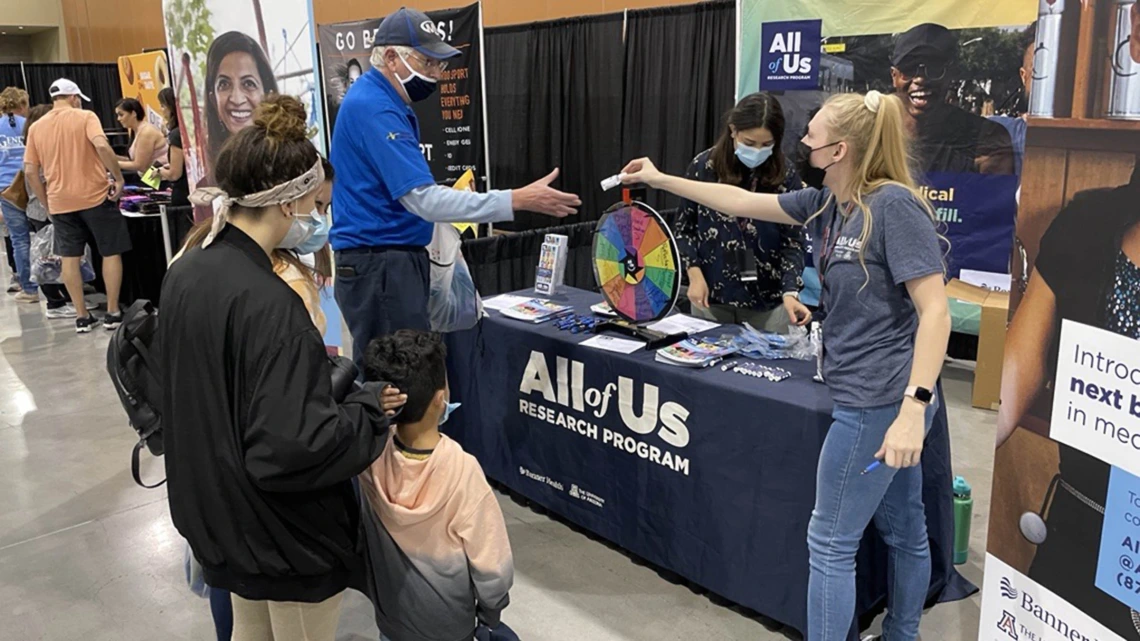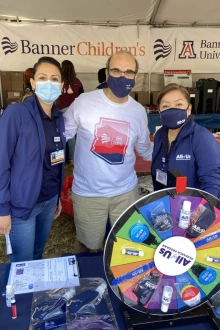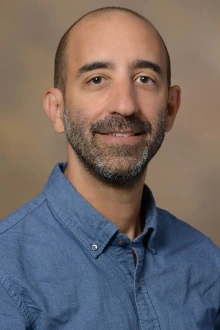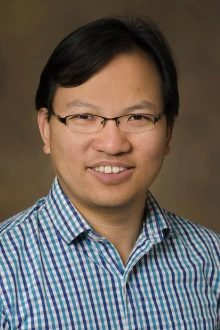All of Us Reaches Participant Milestone
University of Arizona – Banner Health All of Us Program team leads the country as it closes in on 50,000 participants.

Marissa McLelland (right) an engagement coordinator with All of Us UArizona – Banner, talks with people interested in the program while she hands out information and branded hand sanitizer.
One of the University of Arizona Health Sciences’ strategic areas of focus is designing and developing precision treatments for all populations.

Carrie Whitten Simmons (right), senior marketing, communications and engagement manager for the All of Us UArizona – Banner Health, and Tony Wheaton, engagement coordinator, pause for a photo while working at the All of Us table at an event.
The NIH All of Us Research Program, which launched in May 2018, has a 10-year goal to register 1 million or more participants nationally, and the Arizona team has a goal of 100,000 participants. Nationally, about 320,000 participants have signed up and completed the initial steps in the program.
In recognition of the team’s success and to celebrate the Arizona participants, Gov. Doug Ducey proclaimed March “Arizonans in Health Research Month.” One of the governor’s senior advisors will present the proclamation March 16 during a reception at the Phoenix Biomedical Campus.
“Having the governor issue a proclamation declaring March ‘Arizonans in Health Research Month’ not only draws awareness to the program, but also shows support of the program and recognizes that involvement in health research may help improve health care for future generations in Arizona and beyond,” said Carrie Whitten Simmons, senior marketing, communications and engagement manager for All of Us UArizona – Banner.
Focus on underrepresented in biomedical research
The program is striving to sign up people in underrepresented biomedical research categories, including racial and ethnic minorities as well as sexual and gender minorities, people of all ages, and people of diverse income and education levels.

Andreas Theodorou, MD, (center) professor and vice chair of the Department of Pediatrics at the College of Medicine – Tucson, pediatric intensive care doctor at Banner Health and co-PI for All of Us UArizona – Banner, promotes the program at the El Tour de Tucson with engagement coordinators Brenda Mora Perez (left) and Susana Vásquez (right).
Of Arizona’s 50,000 participants, 81% are from groups underrepresented in biomedical research categories, with 53% specifically from groups racially or ethnically underrepresented in biomedical research.
The All of Us UArizona-Banner team includes 67 research coordinators who recruit and enroll participants and coordinate research. Andreas Theodorou, MD, professor and vice chair of the Department of Pediatrics at the College of Medicine – Tucson, chief clinical education officer, Banner University Medicine and co-PI on the team, said they were able to publish a paper in Clinical and Translational Science on their successful recruitment experience.
“One of the key requirements for a successful database is that it is diverse – diverse in ethnic backgrounds, diverse in age, diverse in all sorts of factors,” said Dr. Theodorou. “And we’ve been very successful at enrolling a diverse population.”
Saving UArizona researchers time and money
In addition to leading the country in participant enrollment, All of Us UArizona-Banner already has over 40 researchers using the database.

Yann Klimentidis, PhD
“We hope to learn more about the causes and consequences of obesity and related diseases, and how these differ across racial, ethnic and gender groups,” said Dr. Klimentidis, who also is a member of the BIO5 Institute. “The All of Us data gives us an unparalleled opportunity to investigate these and other questions.”
Another researcher taking advantage of the All of Us database with five ongoing research projects is Haiquan Li, PhD, assistant professor in the Biosystems Engineering Department and a member of the UArizona Cancer Center.
In one project, Dr. Li and his collaborator Yin Chen, PhD, professor of pharmacology and toxicology at the R. Ken Coit College of Pharmacy, are looking at valley fever and how, due to climate change, it is appearing in many states outside of its typical range. They are researching the potential long-term effects for other comorbidities which have rarely been studied because of the high cost.
“All of Us data is extremely helpful for this project,” said Dr. Li. “Valley fever is a rare disease, and collecting data over a scale large enough to gain statistical significance is difficult and expensive. To trace the variety of possible comorbidities not only is expensive, but also practically intractable for long-term effects. These issues do not exist in the All of Us Research Program, as it is designed to collect as many participants as possible, be data-driven and longitudinal, and it has support over a long term.”

Haiquan Li, PhD
In addition to the scale and diversity the database offers, it can save researchers significant time and money, accelerating health and wellness discoveries and treatments. “Instead of having to start from scratch on a research project, all you have to do is mine the data that already exists,” explained Dr. Theodorou. “As a result, your research questions will get answered in a fraction of the time.”
As the UArizona-Banner Health All of Us team celebrates their success at the halfway point to their goal of 100,000 participants, they are expanding their efforts to sign up the next 50,000 and increase the number of researchers using the database. The team is planning an event in Tucson on March 22 to introduce researchers, faculty and students in science and medicine fields to the Researcher Workbench.
“The event not only will celebrate the great success Arizona has seen in reaching 50,000 participants, but also highlight the types of studies being conducted using the All of Us data and support researchers who would like to utilize this valuable resource,” Simmons said.

